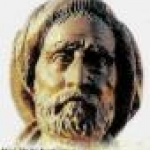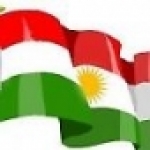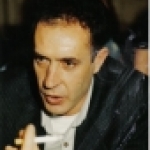JOOST R. HILTERMANN, A Poisonous Affair: America, Iraq and the Gassing of Halabja (Cambridge:
Cambridge University Press, 2007). Pp. 314. $29.00 cloth.
REVIEWED BY CHRIS TOENSING, Middle East Research and Information Project (MERIP),
Washington, D.C.; e-mail: [email protected]
doi:10.1017/S0020743809091223
It is painful to recall, amidst the horrors of the present Iraq War, that the 2003 U.S. invasion
was sold partly as a remedy for the horrors of Iraqi wars past. The Bush administration's
refrain that Saddam Hussein “gassed his own people“ was a scare tactic, to be sure—imagine
what he might do to people not “his own“—as well as a call for belated redress of the coldblooded
murder of some 5,000 Kurds with chemical weapons at Halabja on 16 March 1988.
Halabja, as Joost Hiltermann writes in A Poisonous Affair, is a word akin to Srebrenica or
Dresden (p. xii): it stands alone in evoking what happened at the place it names, and it also
stands in for a sequence of atrocities, in this case the genocidal Anfal campaign meant to
crush the Kurdish rebellion during the Iran–Iraq war.
Hiltermann has written a masterly account of the Halabja tragedy, one part investigative history
and one part indictment of the U.S. and international silence that greeted Iraq's systematic
use of poison gas at the time. In snappy, unsentimental prose, he reconstructs the full historical
context of the lethal assault and explains why it continues to have deleterious consequences
for international peace and security today. Crucially, and in marked contrast to those who cited
Anfal as justification for an ex post facto humanitarian intervention, Hiltermann locates Anfal
and Halabja within the pattern of Iraqi chemical attacks upon Iranian soldiers. Halabja might
not have occurred, one is compelled to conclude, had the U.N. Security Council bestirred itself
to condemn Saddam's chemical warfare on the Iranian front with the appropriate alacrity and
severity.
The investigative history is based heavily on Hiltermann's personal experience as researcher
of Halabja and Anfal for Human Rights Watch in the early 1990s. In the course of his research,
he reviewed captured Iraqi mukhabar¯at files and interviewed Kurdish survivors of the Anfal
gassing and deportations. Later, he filled out the brief for the book with study of U.S. and
U.N. documents and interviews with Iraqi and Iranian veterans, Iranian battlefield doctors,
State Department and U.S. intelligence officials, and many others. There is a very helpful
roster of interviewees, replete with titles and statements of relevant knowledge or expertise,
at the back of the volume. The overall picture would seem to be the most complete possible
given Hiltermann's facility in Arabic but not in Kurdish or Persian. A Poisonous Affair's
scholarly mien is blemished only by the occasional incorrect transliteration (“human wave
attacks,“ for instance, is rendered “amwaj bashiriya,“ p. 25).
As a historian, Hiltermann is meticulous and eminently fair. He gives a thorough hearing to
contrary views, enhancing the power of his case against U.S. and international inaction. For
example, he devotes an entire chapter to evaluating the claim, in State Department “talking
490 Int. J. Middle East Stud. 41 (2009)
points“ circulated in April 1988, that “both Iran and Iraq used chemical weapons in the
fighting around Halabja“ (p. 126). This assertion was of a piece with the long-standing State
Department reluctance to name Iraq as the perpetrator of gas attacks on the Iranian front,
which was dictated by the U.S. “tilt“ toward Iraq throughout the 1980–88 fighting. The “tilt,“
in turn, led Washington to lobby for limp U.N. statements as the reports of illicit armaments
mounted, culminating in the 9 May 1988 Security Council resolution mourning Halabja but
fecklessly calling on “both sides to refrain from the future use of chemical weapons.“
From Hiltermann's sifting of the evidence, three points of particular interest emerge, here
in ascending order. First, “there is no convincing evidence“ (p. 157) that Iran ever used
chemical weapons during the war, although “the jury is still out“ (p. 164) on allegations
by Iranian Kurds that Iran dropped mustard gas on them. Second, the likely source of the
“Iran did Halabja“ rumor is Col. Walter “Pat“ Lang, the former Defense Intelligence Agency
official who famously coined the phrase “drinking the Kool-Aid“ to describe the grip of the
neoconservatives' cherry-picked intelligence on Iraq within the national security state. In an
interview with Hiltermann in 2000, Lang not only stuck to his guns but also offered a window
into U.S. policy calculations with this query: “On the battlefield, why is it [chemical weapons
use] worse than other weapons?“ (p. 203). Third, earnest U.S. remonstrations with Baghdad
over gas attacks were repeatedly undercut, not only by revelations of dealings with Tehran, as
in the Iran-Contra episode, but also by high-level telegraphing of the “tilt.“ As David Newton,
ambassador to Iraq from 1984–1998, put it, “We had an interest in preventing the use and
spread of these weapons. But it obviously was a futile exercise. Their attitude was, ’You want
us to win the war, so. . . .“' (p. 74).
A Poisonous Affair is required reading for students of the Iran–Iraq War, Iraqi history,
Kurdish history, and U.S. Middle East policy. It is provocative reading for students of international
relations, given its larger thesis, sure to be derided as softheaded in some quarters,
that U.S. and U.N. failure to condemn Iraqi chemical weapons use undermined the strategic
interest of the West as well as aspired-to human-rights norms. With regard to strategic interest,
Hiltermann is most convincing when he argues that Iran was driven to its own chemical and
(possibly) nuclear weapons research by the free pass given Saddam's chemical bombardiers.
And the damage to human rights and human beings? The thousands of graves of Kurds and
Iranian soldiers are of course the most powerful testimony, followed closely by the hacking
coughs of the hundreds still dying protracted deaths from mustard gas inhalation today. However,
listen also to the Halabjan who asked in 2002 about the pending U.S. invasion of Iraq:
“In 1988 they closed their eyes to Halabja because Saddam was the enemy of Iran. But now
he's the enemy, and they are using my town as an excuse. We feel bitter, used, sickened“
(p. 183). Indeed.
tesekkuru nicin ettigini anlamadim
ancak hem benim yazdigim ana konusu
Halabja nin uluslarrasi hukuk platformunda
adinin tam olarak konulmasi icin ugrasilmasi gerektigine dair
hem de
yan mevzu olarak, dunyanin duyarsizligina ve ideoljilerin iki yuzlugune ve allaha VEYA tanriya inanlarin ahlaki egilimlerine dair yazimda
bula bula allah vs tanri kelimelerine ustelik de deyim diyerek takdigini gordum.
kisa kisa yazdigin diger mesajlara da baktim
uc mesajda hakkinda ne kadar fikir edinilebilirse o kadarla yaziyorum.
kisa mesaj guzel ve derin olursa gayet iyidir. ozenilir
seninkiler berbat
ana konuyu birakip sacma sapan mevzulara
cahil ve curetkarlara has bir tonda yorum yaziyorsun
deyimlere merakli olmalsin (yaga yag surulmesi gibi)
sana deyimlerle yazayim
niyetin baga girip uzum yemek mi
bagci dogmek mi?
dikkatini cekerim
buradaki bagcilarin
bir elinde bir salkim uzum
oteki elinde yakici kizilcik cubugu vardir.
sana once tanri(God) inanlar ile Allah-ellah a inanlar arasinda
bize manasiz gelse de
dilbilim-etimolji tersini soylese de
bu terimleri bir birinin dengi olarak yorumlamak istemeyen milyarlarca insan var
Allahi arap hebrev aramaik gelenegin God of the gods (tanrilarin uzerindeki)
olarak algilamasi yani sira
hirstiyan, hindu veya oteki dinlerde Allah i tanri(God) olareak cevirmek istemezler. yani onu butun dinlerdeki ortak tanri-god olarak , generik terim olarak gormek istemezler.
tersi de dogrudur
islam da Allahi, oteki dinlerdeki God-tanri konsepti ile s degerde tutmaz.
dilbilim acisindan sacma gelse de inanmis kislere
ateistlerin neyin sacam neyi rasyonel oldugunu soylemsi de baska bir duzeyde sacmaliktir.
dunyasi ekmek ustune margarin veya tereyagi surmekten ibaret olanlar icin
yaga yag surulmez
teknoloji bilim dunyasinda ise termal ozelligi ve mekanik ozellikleri farkli olan yaglar isiya ve fiziksel surtunmeye asinmaya karsi bir biri uzerine surulur.
yani yaga yag surulur. vesselam her duydugun deyimden hayat ilkesi cikarma-dunyan daralir.
bak baga muhtemelen bagci dogme niyeti ile girdin
bagci sana gulumseyerek bir salkim uzum de uzatti
sansini fazla zorlama
uzumu ye
gene tesekkur et
halabja zincirini de boylece sayende battal ettik!
iyi mi ettik?
HeK
bir elinde salkim uzum
otekinde bir sise sarap
hek sansini fazla zorlama
uzatigin üzüm üstünde sadece sen hak sahibi degilsin
bilki onda yetim hakki var
bonkerlik yigitligin racunu, ama bu beko evanlar buna degmez
iyisimi görmemezlikten gel
alnindaki kara lekeyle debelesin dursun
merhaba
anlasilan sen cit uzerinde
elde kizilcik cubugu ile bekleyen bagcilardansin.
bari kuflenmeye yuz tutacak
gecen yilin hasadinin urunu pestillerden ver abdoculara
nihayetinde bunlari da bir ana dogurmus
hem de kurd bir ana
yapma etme
o kadar coklar ki
ister istemez goruluyorlar
gorulen sey de gormezden gelinmemeli
neseli ve saglikli gunler
iyi hasatlar
HeK
bakimsiz bagin bagcisi
selam hek
bence bir cumlelik allah-tanri kelimesine bosuna cok zaman harcamissin. neyse sende zaman ekonomisinin onemi cok ama turkce dili ekonomisi yok, dolu gibi dokuluyor dilinden. iyi yani
allah -tanri etimoloji-semantik yaklasimini ben bir tarafa birakiyorum. dilbilim konusu beni asar simdi, o konuda goruslerim var tabi
halepce ve
bdb ile ilgili cumleye de bakarak tesbitini de yapmissin, ama acele olmus, birde bu sitenin ruhuna uyan bir yoruma hemen kacmissin: iste apocular her kosede
oyle degil aslinda
ben is olsun bdb ve roj tvye atifta bulundum, cunku bu newroz sitesinde anti pkklik irin haline gelmis ki bazi realiteler gormezlkten gelinyor.
ornek olarak:
ben sahsen aso zagrosinin yazilarini okumaktan vazgectim, cunku ahlaki olarak dogru bulmyorum.cunku sitede pkkya istedigin kadar kufur et bastaci, ama koseden haklarinda pozitif bir mesaj at derhal silinir.
bakalim silinir mi diye fazla anlami olmayan bir iki cumleyi suraya buraya yazdim, roj teveyle lgili hemen kaldirdilar. yadigim suydu: roj tve ye destek cikalm
halepce onerine gelince:
ilginc bir yaklasim diyebilirim, yalniz pratiklesme sansi nasil olur fikri yurutemem.
haydi sana basarilar
benim
peder sevmezdi allahi tanri seklinde anmayi
sonra ogrendim ki bir suru kisi var bu iki teriimi birbrinden ayirmaya ozen gisteren
(islamcisindan hiristiyanina her kesimden)
dilbilim de her sey de sirada insan icin
o beni asar bu beni asar
kim konusacak bunlari?
tanri allahi vs gecelim
roj tv ye destek?
neredeyse kac yil oluyor ben bu tv yi seyretmiyorum
yuzbinlerce seyredeni var
onlar icin yasaklanmamasi gerekir
arada aklima haberleri geliyor-tiksiniyorum
ben tiksiniyorum diye yasaklansin diyenlerden degilim
ben onlardan tiksinmeye devam edecegim-asagi apo yukari apo diye diye
koca ulusu bu tiyniyetsizin got cebine sokmakta buyuk rolleri var
bizim cahil gobelslerimizler
(gobels hem cok zeki hemde cok kulturlu bir katildi-bizimkiler
katil degil ama hem essek hem gerzekler-kusura bakma!9
gene de yasaklanmamalilar-
avrupanin pkk de olsa kurdlere yaklasimi dupeduz hukukdisidir
zoraki gerekceleri ozel tuzaklarla yaratiyorlar
hukuk duzpeduz politikanin oyuncagi oldu ki
daha once yazdim bu 300 kusur yillik
avrupayi avrupa yapan
ve bizi o moodeli benimsemeye ikan eden
300 kusur yillik kuvetler ayriligini ayaklar altina almaktir.
kime yapilsa karsi durmak lazim-
burdasansur uygulaniyor mu?
elbette uygulaniyor
acara karsi hizla uygulaniyor
bunu nicin yaptiklarini da hala anlamis degilim.
acar enfant terible dir-cok kisiyi cok kolay irrite eder
bu huyundan vazgecsin mi?
niye?
bu kadar homojenlik talebi bana kemalistleri hatirlatiyor.
burya PKK yi savunan -apo yu savunalra da yazmali-bana sorsalar benim tercihim boyle
yazsinlar
mubala tartsima olsun
ahmakliklarini belki boyle farkedecekler
baska?
halapceyi-ahlaki dip notu birakip iki kelimeye takman hoshh degildi
seni yanlis tanitti-iyi mi oldu?
hayir kotu oldu.
simdi takipci bana da kizilcik sopasiyla vurack!
vursun-sanaldir acitmaz!
boyle boyle sahici bir tolerans ile sahici bir dialoga ulasacgiz
ortalik sahtelerinden gecilmiyor
masklerle dolu.
once sansursuz, es dost demeden her ellestiriyi yaptigimiza bir birimizi inadirdiktan sonra
tolerans ve dialogumuzun sahiciligi de kanitlanmis olur
neseli ve saglikli gunler
HeK
halebce konusunu dip not gibi gecmek degil de mailin sonuna eklenmesi belki dogru degildi, nedeni de ciddi konuklarda insanin bazen duygulari aciz kaliyor desem belki daha dogru olur
sana da neseli aksamlar






Halabja yi DEGISIK bicimde anmak